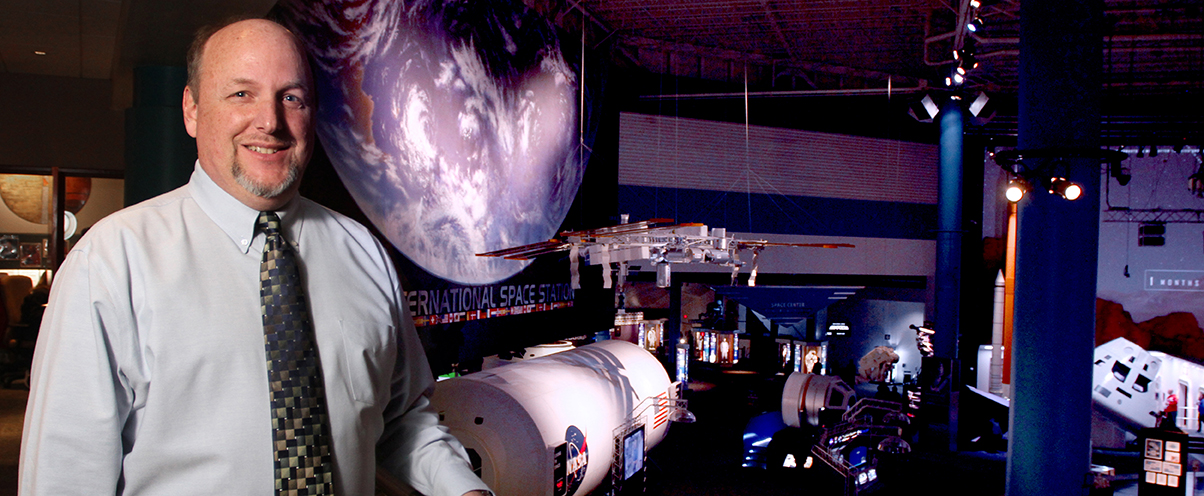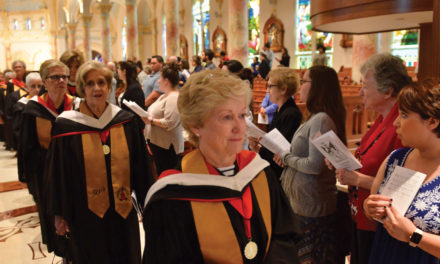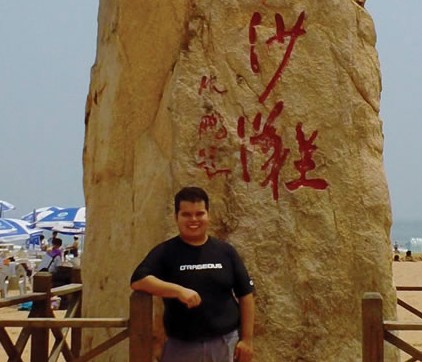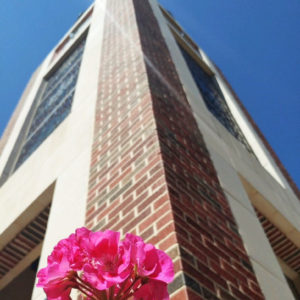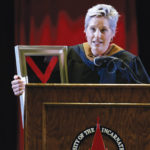Abstract concepts become real-life projects for MBA students
By Sherrie Voss Matthews

Carla Parker (from left), of the Medina Children’s Home, helped the Spare Change team, which included students Sam Mendez, Erika Rodriguez, Susana Deku and George Minitch, with their raffle that raised just under $1,000. Their corporate sponsors were Americus Diamond, Texas Shine Car Wash, the Wash Tub, Tesoro and Hewlett Packard.
At first glance, the evening class in Room 109 of the Gorman Building appears to be perfectly normal. About 20 students intently watch a video about accounting principles. Some take notes on computers; others jot down key points in notebooks.
The classmates are a mix of traditional and nontraditional students. It is what you might expect in an evening class on campus, but Dr. Tracie Edmond’s managerial accounting class is anything but ordinary.
These candidates seeking their Master in Business Administration from the H-E-B School of Business and Administration are studying accounting principles: You’ll see thick books about accounting on the desks and videos about top-down budgeting versus bottom-up budgeting during class discussions.
The difference is the topic of these class discussions.
Perhaps, dodge ball. Or how to gather sponsors for a raffle.
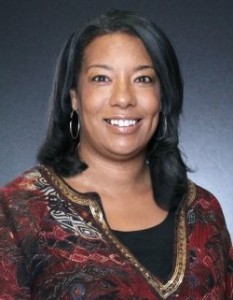
Dr. Tracie Edmond motivates her class by taking projects outside the classroom to help local nonprofit organizations with fundraising efforts.
Edmond, a third-year professor at Incarnate Word, has her managerial accounting students put the abstract principles of accounting into concrete practice. For the past four quarters, she has had her students develop fundraising plans for nonprofits.
“I thought, ‘Wouldn’t it be fun to take the same concepts in class and use them with nonprofits?’ ” Edmond explains. “When students prepare a budget for a fundraising event, they have to put managerial accounting into practice. They have to do break-even analysis, budget-to-actuals, and plan.”
The planning starts from day one. Edmond assigns her students a nonprofit client, and then sets them loose. Each four-hour class is broken into traditional lecture and discussion. The class breaks into small groups to plan their fundraising efforts. Students give weekly presentations on how they met each target, keeping them focused and on track to hold the events.
Putting the theoretical into real-life practice is paying off.
Edmond’s nonprofit accounting class raised $1,900 for the Medina Children’s Home during the eight-week semester ending in May. Previous classes have earned $1,500 for the Women’s Global Connection, a ministry of the Sisters of Charity of the Incarnate Word, to help women in Africa start their own businesses. Another managerial class raised an additional $1,300 for a Women’s Global Connection water project, and yet another raised $2,300 for a battered women’s shelter.
While the students have raised an impressive amount for several good causes, Edmond was surprised by their self assessments.
“They always think they could have done more,” she said. “It really is amazing to see. The students are so creative.”
Take dodgeball, for example. One student group in the spring decided to think out of the box and on the court. They asked a local dodge ball league to consider a tournament to benefit the Medina Children’s Home.
“We wanted to do something creative,” student Jennifer Boese explained. “It was easy.”
Tommy Waldrip’s group decided to follow a more traditional route. They planned a raffle. Most donations came from their existing contacts; cold calling was a bit more challenging.
In the process, they learned about hidden costs. At first, they didn’t take into consideration one of the hidden costs of event planning: time.
“You realize all of the small costs that would have been forgotten,” Brian Berner said.
The lesson learned by Edmond’s class went beyond traditional classroom teaching. They learned how to apply accounting principles to a real-world cause. While working to develop a fundraiser for a nonprofit is important, there is a more meaningful message being taught through this practical exercise. It illustrates to business students how they can share their time and talents with the world around them.
“Since we are a faith-based organization, the students each have God-given talents,” Edmond said. “I think the students as accountants don’t know how to utilize those beyond the certified public accounting exam. They don’t see how they can use these skills and talents to benefit themselves and the community.
Her class offers students something more than memorization and books. It offers them a chance to make a difference.
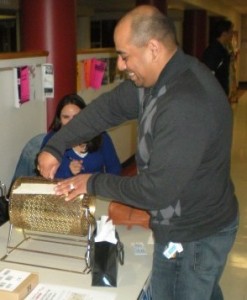
Sam Mendez prepares for the raffle his team designed as a fundraiser during Edmond’s managerial accounting class.
“I didn’t realize how much everyone is willing to help when you want to raise funds for a good cause,” Devashnee Rodrigue said.
Giving back gives the students something extra: excitement. It inspires them to come to class, even if they are exhausted, had a long day at work, or could otherwise be tempted to skip a night. When asked one evening, the class as a group admitted that when they registered for managerial accounting, they were unenthused about this required MBA course. Now, after working on their projects, they have a different point of view.
“It’s a lot more fun to work on a project for a cause,” Berner explained.
The practical component helps students comprehend abstract concepts, perhaps better than any book or lecture ever could.
“To tell you the truth, it is a very unique class that gives you a hands-on experience while you acquire knowledge at the same time,” Susana Deku said. “Even though we have not finished our syllabus yet, there are so many experiences and so much knowledge I have accumulated. I wish each MBA class at UIW would adopt this method of practical teaching because the more we try the things we are taught in the real world, the more it sticks in our mind and gives us a hands-on experience, too.”
Several nonprofit groups have asked for assistance from Edmond’s class. She is working to incorporate more organizations into future class projects. Her vision is for students to use what they learn in class to teach these groups how to improve their future fundraising efforts.
Susana Deku continued her volunteer work with Women’s Global Connection. See the story here.


